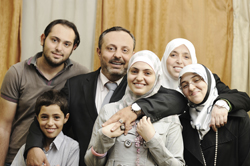The politics of Muslim integration in the EU
With the support of EU funding, the EURISLAM(opens in new window) project focused on the consequences of these different approaches of immigrant countries. The aim was to determine how these then influence patterns of cultural distance and interaction between Muslim immigrants (and their descendants) and the receiving society. Countries included in this study were Belgium, France, Germany, the Netherlands, Switzerland and the United Kingdom. EURISLAM evaluated how different traditions have affected the public debate regarding Islam, over the last decade in Europe. Findings highlighted different ways in which European countries deal with religious and cultural differences, and how the nature and scopes of public debates are differently configured at national and European levels. Project partners focused on the interaction between variables at the macro or national level (e.g. citizenship and cultural policies) and variables at the micro or the individual level (e.g. feelings of acceptance and ideas of cultural distance). As such, variations in national identity, citizenship and church–state relations are seen as essential to the experience of cultural distance and interactions between Muslims and their receiving societies. EURISLAM research activities generated a wealth of information on ethnic and religious identity, language, perceived cultural distance, networks, and Muslims and debates in the media. Analyses in these and other areas offered critical insights into the social–cultural integration of Muslims in Europe, with the study outlining a set of steady factors that can be used to understand the current state of affairs. These pertain to educational attainment, position in the labour market, religious identification and the bridging of social capital. The issue of integration is a dominant theme, one that structures the public debates on Muslims and Islam. Issues related to religious rights and minority social problems are major issues within this field, and therefore questions regarding Muslims in Europe are strongly tied to national characteristics and traditions, with supranational actors playing a small role in the integration debate. In the interest of improved relations, EURISLAM formulated a number of policy recommendations. These relate to better nation state support, the important role of civil, professional and other organisations in facilitating integration, and a shift in media coverage, away from attention focused exclusively on dramatic events. Recommendations also encourage developing policy that promotes the social–cultural integration of European Muslims with a focus on individual characteristics such as education, labour market position and bridging social capital.




